|
|
|
Sort Order |
|
|
|
Items / Page
|
|
|
|
|
|
|
| Srl | Item |
| 1 |
ID:
125952
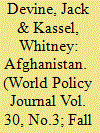

|
|
|
|
|
| Publication |
2013.
|
| Summary/Abstract |
The withdrawal of NATO forces from Afghanistan in 2014 is likely to be followed by a civil war between a predominantly non-Pashtun security apparatus and Pakistan-backed Taliban forces. As we confront this reality, we would be wise to look closely at the experience of the Soviet Union following its occupation of Afghanistan in the late 1980s. The prime lessons from that ill-fated moment are the need to provide continued economic and military support to the leadership in Kabul and to obtain the support of Pakistan, while maintaining sufficient intelligence and covert action infrastructure on both sides of the frontier the two countries share. A sustainable relationship with Pakistan is critical today because of the country's important role in any political solution in Afghanistan and the significant risks to the international community posed by Pakistan's own instability.
|
|
|
|
|
|
|
|
|
|
|
|
|
|
|
|
| 2 |
ID:
132793
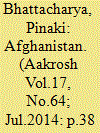

|
|
|
|
|
| Publication |
2014.
|
| Summary/Abstract |
General Boris Gromov, commander of the 40th Army of the Soviet Union, crossed the 'Friendship' bridge linking the Salang Pass on 15 February I989. hack to the motherland. Najibullah. the Afghan president and a Communist protege' of the USSR regime of Mikhail Gorbachev, was ousted from power in April 1992. The intervening three years have a story to tell to the various protagonists of the current Afghan drama being enacted right now as another superpower gets ready to decamp without completing what it set out to do. The Red Army had left in early I989, and its nominee, Najihullah. held on to power for another three years on the strength of the same Afghan army that had desertions, remained fragmented in factional lines - the Parchams and the Khalqis - and was depleted in terms of resources.
|
|
|
|
|
|
|
|
|
|
|
|
|
|
|
|
| 3 |
ID:
172089
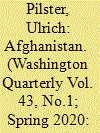

|
|
|
| 4 |
ID:
118602
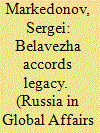

|
|
|
|
|
| Publication |
2012.
|
| Summary/Abstract |
The USSR ceased to exist in December 1991, but the dramatic events of the two subsequent decades have shown that it is premature to view its collapse as a closed chapter of history. The termination of the Soviet Union's existence as a legal fact and the historical process of its disintegration are different things. The country that accounted for one-sixth of the planet's land is gone from the world map, but the disintegration of Soviet statehood persists. Like the breakup of the Western Roman Empire does not boil down to the abdication of Romulus Augustus, or the French Revolution to the storming of the Bastille, or Russia's 1917 October Revolution to the October 25 (in the Julian calendar) coup, the breakup of the USSR is not confined to the December 1991 Belovezha declaration by heads of states of Russia, Ukraine and Belarus on its dissolution. That the process still continues is evidenced by eight armed conflicts, the de-facto emergence of new states (two of which have won international, albeit limited, recognition), unending border disputes, ethnic and religious clashes, and regional conflicts. In 2008 a precedent was created when the borders of former Soviet republics were redrawn. Given unsettled ethno-political conflicts, it is hard to predict when and how these borders will be recognized, and where the self-determination process, launched by Mikhail Gorbachev's perestroika policy, will stop.
|
|
|
|
|
|
|
|
|
|
|
|
|
|
|
|
| 5 |
ID:
095515
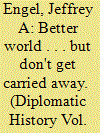

|
|
|
| 6 |
ID:
108197
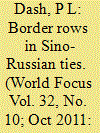

|
|
|
| 7 |
ID:
108004


|
|
|
| 8 |
ID:
107339
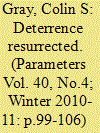

|
|
|
| 9 |
ID:
110450
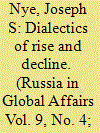

|
|
|
|
|
| Publication |
2011.
|
| Summary/Abstract |
In a world of new transnational challenges created by non-state actors the United States and Russia have much to gain from working together to cope with these new challenges. In short, the U.S. has more to gain from partnership with a strong reformed Russia rather than a weak declining Russia.
|
|
|
|
|
|
|
|
|
|
|
|
|
|
|
|
| 10 |
ID:
110466
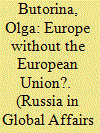

|
|
|
|
|
| Publication |
2011.
|
| Summary/Abstract |
The EU's biggest problem today is the loss of the European idea and the vagueness of European self-identity. Despite the ongoing process of enlargement, EU leaders have been unable to persuasively answer the question of what it means to be a European today.
|
|
|
|
|
|
|
|
|
|
|
|
|
|
|
|
| 11 |
ID:
093169
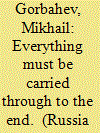

|
|
|
| 12 |
ID:
105035
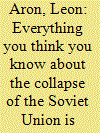

|
|
|
|
|
| Publication |
2011.
|
| Summary/Abstract |
Every revolution is a surprise. Still, the latest Russian Revolution must be counted among the greatest of surprises. In the years leading up to 1991, virtually no Western expert, scholar, official, or politician foresaw the impending collapse of the Soviet Union, and with it one-party dictatorship, the state-owned economy, and the Kremlin's control over its domestic and Eastern European empires. Neither, with one exception, did Soviet dissidents nor, judging by their memoirs, future revolutionaries themselves. When Mikhail Gorbachev became general secretary of the Communist Party in March 1985, none of his contemporaries anticipated a revolutionary crisis. Although there were disagreements over the size and depth of the Soviet system's problems, no one thought them to be life-threatening, at least not anytime soon.
|
|
|
|
|
|
|
|
|
|
|
|
|
|
|
|
| 13 |
ID:
060130
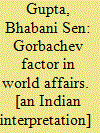

|
|
|
|
|
| Publication |
DelhI, B. R. Publishing, 1989.
|
| Description |
ix, 507p.
|
| Standard Number |
8170185459
|
|
|
|
|
|
|
|
|
|
|
|
Copies: C:1/I:0,R:0,Q:0
Circulation
| Accession# | Call# | Current Location | Status | Policy | Location |
| 043293 | 327.47/GUP 043293 | Main | On Shelf | General | |
|
|
|
|
| 14 |
ID:
118438
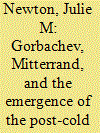

|
|
|
|
|
| Publication |
2013.
|
| Summary/Abstract |
More than two decades since the Cold War's end, the new 'united' Europe resembles the old divided one, without the ideological cleavage. Transferred farther east, the continent's re-division condemned Russia to Europe's fringes where it remains today. Some scholars trace the origins of this fault line to 1989-1990, blaming the United States, Germany and the USSR for failing to erect pan-European security foundations. Few, however, focus on the not insubstantial role of France in this story. Mikhail Gorbachev's close ties with his intellectual mentor François Mitterrand contributed to the failure in unexpected ways. This essay explains this element in the history of the pan-European idea while also shedding light on the politics behind the birth of the EU.
|
|
|
|
|
|
|
|
|
|
|
|
|
|
|
|
| 15 |
ID:
115854
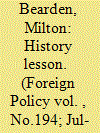

|
|
|
| 16 |
ID:
183255
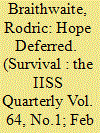

|
|
|
|
|
| Summary/Abstract |
The Soviet Union was formally replaced by the Russian Federation on 25 December 1991. Americans felt they had won the Cold War. Russians felt an angry sense of humiliation. The Soviet potential for collapse had become visible after Josef Stalin died in 1953. It was not corrected by the Soviet leadership nor picked up by Western governments, and it was masked by Soviet military and international success. But eventually the Soviet leadership could no longer ignore the growing crisis. They appointed Mikhail Gorbachev to find a remedy. He failed. His eventual successor, Vladimir Putin, used force to restore Russia’s role abroad, but ran an increasingly brutal and corrupt regime at home. Russians had hoped that Russia might become prosperous and stable, on good terms with its neighbours. Though that hope was much diminished by Christmas 2021, a flicker nevertheless remained.
|
|
|
|
|
|
|
|
|
|
|
|
|
|
|
|
| 17 |
ID:
122122
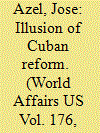

|
|
|
|
|
| Publication |
2013.
|
| Summary/Abstract |
The 2006 succession from Fidel Castro to his brother Raúl, programmed since the early days of the Cuban revolution, was efficient, effective, and seamless. The eighty-two-year-old Raúl, who recently announced that he will step down in 2018, is now orchestrating his own succession behind the scenes. But however the transition from the Castro era plays out, one outcome is off the table: that Raúl will emerge as a reformer to end the Communist era and inaugurate a new democratic and market-oriented Cuba.
|
|
|
|
|
|
|
|
|
|
|
|
|
|
|
|
| 18 |
ID:
119456
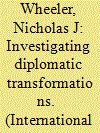

|
|
|
|
|
| Publication |
2013.
|
| Summary/Abstract |
This article investigates the role that diplomacy - especially at the highest levels - can play in transforming adversarial relationships. Building on Martin Wight's exploration of these issues, in particular the question of how two adversaries can convince each other that they are serious negotiating partners, the article contends that achieving a significant de-escalation of a conflict depends upon the growth of trust.
In contrast to Wight's limited conception of what diplomacy could achieve in terms of ending conflicts, the argument made here is that particular types of communicative encounters between diplomats, and especially leaders, can build a level of trust at the interpersonal level which can lead policy-makers to make conciliatory frame-breaking moves. To make good on this claim, the article employs a case-study of the summitry between US president Ronald Reagan and his Soviet counterpart, Mikhail Gorbachev.
The key contention here is that the face-to-face encounters between Reagan and Gorbachev promoted a level of trust between them that made possible the fundamental de-escalation of the Cold War that took place in the second half of the 1980s. Rival explanations focusing on nuclear weapons and Soviet economic decline are analysed, but while these were enabling conditions in the transformation of relations, the article argues that it is necessary to recognize the critical role that interpersonal trust between US and Soviet leaders played in achieving this diplomatic transformation.
|
|
|
|
|
|
|
|
|
|
|
|
|
|
|
|
| 19 |
ID:
118205
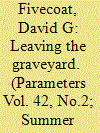

|
|
|
| 20 |
ID:
105037
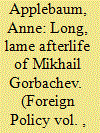

|
|
|
|
|
| Publication |
2011.
|
| Summary/Abstract |
In the most notable of the many photographs snapped at the gala held to mark his 80th birthday, Mikhail Gorbachev seems shorter and rounder than he did in his prime, back when he was one of the most important people in the world. He is inscrutable, only half-smiling; he also looks disheveled, and perhaps unsure of himself. Those impressions may of course be exaggerated by the fact that in this particular picture, the onetime general secretary of the Communist Party of the Soviet Union has his arm around Sharon Stone. Stone is wearing a slinky, champagne-colored dress and bright red lipstick. She is grinning widely. In heels, she is a good 6 inches taller than Gorbachev, which certainly takes away from his aura of authority.
|
|
|
|
|
|
|
|
|
|
|
|
|
|
|
|
|
|
|
|
|